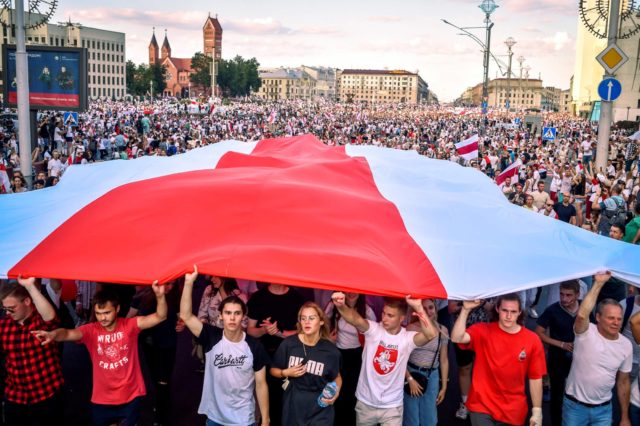
Russia Poised to Arbitrate Regime Change in Belarus (Part One)
Publication: Eurasia Daily Monitor Volume: 17 Issue: 124
By:

What looks to the world as another “color revolution,” this time in Belarus after the August 9 presidential election, outgrew and overwhelmed an initial Russian operation against the disobedient President Alyaksandr Lukashenka. The unforeseen, spontaneous popular protests against electoral fraud have compelled Moscow to change its regime-change plans for Belarus.
The Kremlin had initially decided to use Belarus’s August presidential election as an opportunity to undermine Lukashenka through the candidacies of Viktar Babarika (Victor Babariko) and Valery Tsepkalo, Belarusian establishment figures with high-level Moscow connections. Far less is known about the third counter-candidate’s background, the anti-establishment blogger Siarhei Tsikhanouski (Sergei Tikhanovski), whose wife Sviatlana (Svetlana) ran for president as a stand-in for her jailed husband and claims victory over Lukashenka (see EDM, September 8). Even if Moscow had not expected those counter-candidates to win the presidential election outright, Moscow intended at least to seriously complicate Lukashenka’s post-election situation, split Belarus’s ruling establishment, and render a weakened Lukashenka or his successor more amenable to “deeper integration” with Russia.
Apparently, Moscow did not reckon with mass protests on such a scale against electoral fraud in Belarus. Although the protests are devoid of a central leadership or any organizational framework, lack a political agenda (other than removing Lukashenka personally), and are not “pro-Western” or “geopolitical” in any sense, thereby differing from the “color revolution” pattern, the outward optics are those of a classic color revolution. It is apt to be perceived as such by the Russian public, to the Kremlin’s abhorrence. Moreover, the outbreak of mass protests against electoral fraud in Belarus might inspire similar phenomena in Russia or, at the very least, require Russia’s authorities to redouble prevention measures. The Kremlin, therefore, feels threatened itself by a Belarusian popular movement determined to overturn the official results of the presidential election.
This means that Babarika and Tsepkalo, for all their Moscow connections, are becoming unusable by Moscow; and the victory claimant, Tsikhanovskaia, is now downright unacceptable after moving to Lithuania. Their representatives on the opposition’s Coordination Council have also become useless or unacceptable to the Kremlin for the same reasons. The Council (meanwhile much expanded) has become the symbolic public face of the popular protests—again, with all the optics of a “color revolution.” They never coordinated much but were elevated to symbolic figures by international media, including Russian media in the initial stage, when Moscow was undermining Lukashenka. To arrange a dialogue now between them and Lukashenka (even if he acquiesced, which he does not), or a dialogue between them and Moscow, would amount to legitimizing the popular protests and practically to de-recognizing the official election results. Should the Coordination Council be accepted into a transitional power-sharing formula, and should its candidate win a possible repeat election, it would be seen as the triumph of a popular movement against the electoral machinery of an authoritarian state. Moscow cannot cooperate with such a scenario—even less so since Tsikhanouska and possibly other Coordination Council members look apt to be coopted to work with the West.
For his part, Lukashenka seems to have lost his composure when confronted with the post-election mass protests. Having campaigned on a sovereignist platform, vocally critical of the Kremlin until the election day (August 9), Lukashenka dramatically switched signals and turned to Moscow for support as early as August 11. Russian President Vladimir Putin did congratulate Lukashenka instantly on being re-elected, but the Kremlin did not immediately answer his pleas for support. Russian state-controlled media continued covering the opposition’s Coordination Council favorably until about August 20, at which point Moscow adapted its policy to the changing situation (see EDM, September 8).
The changed circumstances are: 1) unexpectedly large and persistent mass protests, with the prospect of a long-term destabilization of Belarus, the possible exhaustion of that state’s resources, and spillover effects at least economically on Russia; 2) a weakened President Lukashenka, who maximizes his vulnerability by repudiating the multi-vector policy, attacking the West as if to deserve Moscow’s protection; 3) the opposition Coordination Council’s loss of value and relevance to Russia; as well as 4) the cohesion and discipline of Belarus’s governing circles, loyal to Lukashenka at least for the time being, which requires Moscow to identify credible political allies in Belarus before orchestrating a change of regime. Lukashenka had weeded out such elements from the system during his long presidency.



